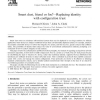Free Online Productivity Tools
i2Speak
i2Symbol
i2OCR
iTex2Img
iWeb2Print
iWeb2Shot
i2Type
iPdf2Split
iPdf2Merge
i2Bopomofo
i2Arabic
i2Style
i2Image
i2PDF
iLatex2Rtf
Sci2ools
CN
2004
2004
Smart dust, friend or foe?--Replacing identity with configuration trust
Smart dust motes are miniature self-contained systems that may be deployed in very large numbers. In military applications these devices are subject to different threats than conventionally deployed systems, for example, attackers may deploy counterfeit devices to subvert the integrity of a system, and this may be a greater concern that confidentiality. The possibility of identity theft reduces the value of conventional authentication methods, prompting a reevaluation of how to achieve integrity in such systems. This paper reviews the authentication problem from first principles, but instead of regarding each pairwise network interaction separately, it shows how to build Configuration Trust in a system as a whole. The new trust process focuses on establishing the type or function of a device, rather than individual identity, supported by key distribution that introduces just sufficient diversity to detect subverted motes. This is embodied in protocols that establish communication with...
| Added | 16 Dec 2010 |
| Updated | 16 Dec 2010 |
| Type | Journal |
| Year | 2004 |
| Where | CN |
| Authors | Howard Chivers, John A. Clark |
Comments (0)

